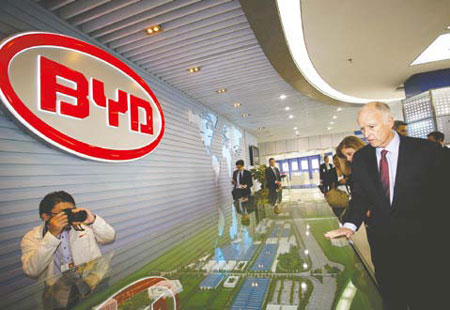Chinese investment sets a record
Updated: 2013-06-07 11:47
By Zhang Yuwei in New York (China Daily)
|
||||||||
|
California Governor Jerry Brown walks past a logo of BYD during a visit to the Chinese automaker's headquarters in China's southern city of Shenzhen in April. The Chinese carmaker is one of the latest investors in the United States with the start of construction on an electric bus factory in the American state. Vincent Yu / AP |
The growing interdependent relationship between the world's two largest economies is perhaps best exemplified by increasing investment.
A number of recently signed megadeals set the stage for today's start of the two-day meeting between Chinese President Xi Jinping and his US counterpart Barack Obama in Southern California.
A decade ago, investment flowed mostly from the US to China, but Chinese investment in the US has quickly caught up. Last year, it totaled $6.5 billion, a 17 percent increase from the previous record of $5.5 billion in 2010.
In this year's first quarter alone, Chinese companies spent $2.2 billion for eight acquisitions and nine greenfield projects in the US, according to a recent report by the New York-based Rhodium Group, a consulting firm which tracks overseas Chinese investments.
Big transactions included Chinese auto-part firm Wanxiang's $257 million purchase of the bankrupt Massachusetts-based battery maker A123 Systems.
The Wanxiang-A123 deal overcame the final hurdle of winning approval from the Committee on Foreign Investment in the United States, or CFIUS, an inter-agency body that reviews foreign investments into the US. CFIUS has been wary of Chinese companies such as Huawei Technologies Co, and ZTE Corp - two Chinese providers of telecommunications equipment that have a presence in the US.
A number of significant greenfield deals were also signed earlier this year, including China's largest property developer Vanke Co's $620 million joint venture with Tishman Speyer in San Francisco.
Chinese meat processor Shuanghui International Holdings acquired the world's No 1 pork producer, Smithfield Foods, based in Virginia, for $4.7 billion, in what would be the biggest takeover of a US company by a Chinese company if approved by US regulators.
Analysts say the summit between Xi and Obama - described by White House officials as giving both leaders an opportunity to have a "substantive, candid and productive conversation" - will enhance economic interdependence and help build confidence for investors from both countries.
Susan Shirk, former deputy assistant Secretary of State in the Clinton administration, said the Xi-Obama meeting at the 200-acre Sunnylands estate is an "excellent idea" for the two leaders to get to know each other better.
Shirk said China's new leadership's focus on economic reforms is an encouraging sign. "Another wave of economic reforms could be very good for US-China relations," she said at a recent event at the Asia Society, a non-profit New York-based organization. She added that such a move would foster an optimistic mood.
Daniel Rosen, a partner with Rhodium Group, said the two leaders meet at a time when US-China relations are at a "critical juncture".
Saying that China is commencing historic economic and political reforms, Rosen said: "The summit is critical to President Obama's understanding of how these changes will define China's future, so that he can shape US policy toward China appropriately.
"If the relationship is defined in mutually beneficial terms, there is great potential for the two to benefit economically, through bilateral direct investment, trade and technological cooperation," Rosen said of the summit. "On the other hand, if the two leaders cannot establish confidence in one another's intentions, then our economic interaction is likely to atrophy."
Ann Lee, an economics and finance professor at New York University, said that while economic exchanges are increasing, the summit will focus more on geopolitical issues including territorial disputes or cyber security.
"But these other issues are just smokescreens for the real items on the agenda," said Lee, author of What the US Can Learn from China.
In reality, Lee said, those economic issues could be "a horse trade like CFIUS granting more acquisitions to China in exchange for China allowing more financial services into the country."
yuweizhang@chinadailyusa.com
(China Daily USA 06/07/2013 page9)

 Michelle lays roses at site along Berlin Wall
Michelle lays roses at site along Berlin Wall
 Historic space lecture in Tiangong-1 commences
Historic space lecture in Tiangong-1 commences
 'Sopranos' Star James Gandolfini dead at 51
'Sopranos' Star James Gandolfini dead at 51
 UN: Number of refugees hits 18-year high
UN: Number of refugees hits 18-year high
 Slide: Jet exercises from aircraft carrier
Slide: Jet exercises from aircraft carrier
 Talks establish fishery hotline
Talks establish fishery hotline
 Foreign buyers eye Chinese drones
Foreign buyers eye Chinese drones
 UN chief hails China's peacekeepers
UN chief hails China's peacekeepers
Most Viewed
Editor's Picks

|

|

|

|

|

|
Today's Top News
Shenzhou X astronaut gives lecture today
US told to reassess duties on Chinese paper
Chinese seek greater share of satellite market
Russia rejects Obama's nuke cut proposal
US immigration bill sees Senate breakthrough
Brazilian cities revoke fare hikes
Moody's warns on China's local govt debt
Air quality in major cities drops in May
US Weekly

|

|








